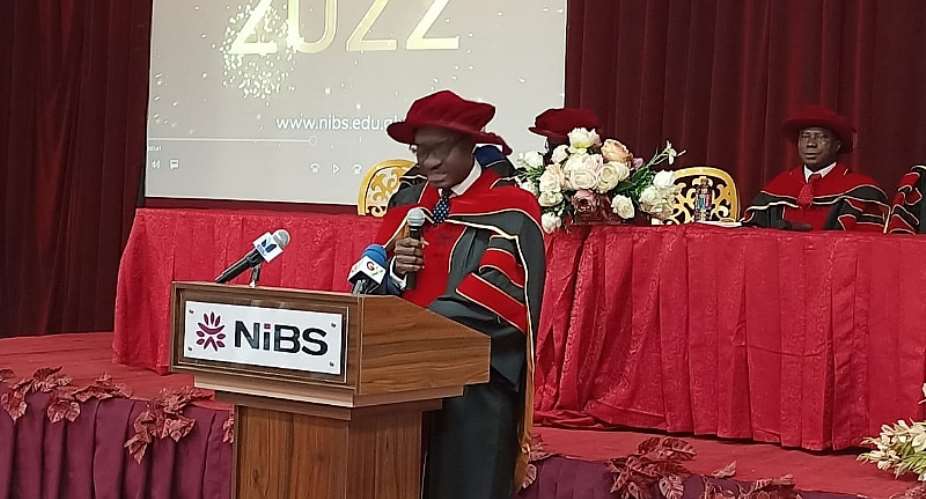A decision by central banks to hike monetary policy rates to stem inflation will not solve the global price evolution, a finance expert has warned.
Dr George Agyekum Donkor, President and Chairman of the Board of Directors of the ECOWAS Bank for Investment and Development, added that the cause of inflation is “structural and not monetary” and cautioned that monetary policy rate hikes could lead to unintended consequences.
Speaking at the 2022 Graduation Ceremony of the Nobel International Business School (NiBS) in Accra, he urged central banks to rather focus on “the supply-side factors, rather than being overly fixated on the monetary factors.”
“This can only be resolved through effective monetary and fiscal policy coordination to resolve the supply-side issues.” Dr Donkor said.
Ghana in October this year recorded inflation of 40.4 per cent, from 37. 2 per cent recorded in the previous month.
Last month, The Bank of Ghana increased the Policy Rate by 250 basis point to 24.5 per cent, the highest policy rate increase since 2017.
Dr Donkor said the effectiveness of such policy rate hikes remained difficult to estimate as inflation had continued to gallop in many jurisdictions despite the policy hikes.
“While the monetary policy tweaks are deemed necessary to an extent, it is very important to underline that the cause of inflation is structural and not monetary,” he said.
Dr Donkor said the Russian-Ukraine war had led to a downward revision of the projected growth rate, adding that 2023 “will not fare any better” if the war did not end anytime soon.

“Central banks should be less hawkish in increasing the monetary policy rate, given the overall impact rate hikes have on the cost of funds and growth. Governments should counterbalance rate hikes with supply-side policies to address the incessant inflationary trend,” he proposed.
Dr Donkor urged development finance institutions to deploy some of their resources to finance critical needs such as fertiliser importation programmes to help ease the burden of the populace.
“Financial institutions should look to support governments to develop import-substitution industrialisation programmes, to ease the pressure on the exchange rate,” he said.
A total of 31 students who had successfully completed a three-year Doctor of Business Administration (DBA) at the NiBS graduated at the event.
Professor Kwaku Atuahene-Gima, Founder and President of NiBS, urged the graduating class to take advantage of the current global economic downturn to develop innovate initiatives that would help address the problem and create opportunities.
“You are all leaders of your organisations. If you can improve your innovative capacity, you will be able to do better for your company and the nation,” he said
GNA





 Tuesday’s downpour destroys ceiling of Circuit Court '8' in Accra
Tuesday’s downpour destroys ceiling of Circuit Court '8' in Accra
 SOEs shouldn't compromise on ethical standards, accountability – Akufo-Addo
SOEs shouldn't compromise on ethical standards, accountability – Akufo-Addo
 Father of 2-year-old boy attacked by dog appeals for financial support
Father of 2-year-old boy attacked by dog appeals for financial support
 Jubilee House National Security Operative allegedly swindles businessman over sa...
Jubilee House National Security Operative allegedly swindles businessman over sa...
 Nobody can order dumsor timetable except Energy Minister – Osafo-Maafo
Nobody can order dumsor timetable except Energy Minister – Osafo-Maafo
 Mahama wishes National Chief Imam as he clock 105 years today
Mahama wishes National Chief Imam as he clock 105 years today
 J.B.Danquah Adu’s murder trial: Case adjourned to April 29
J.B.Danquah Adu’s murder trial: Case adjourned to April 29
 High Court issues arrest warrant for former MASLOC Boss
High Court issues arrest warrant for former MASLOC Boss
 Align academic curriculum with industry needs — Stanbic Bank Ghana CEO advocates
Align academic curriculum with industry needs — Stanbic Bank Ghana CEO advocates
 Election 2024: We'll declare the results and let Ghanaians know we've won - Manh...
Election 2024: We'll declare the results and let Ghanaians know we've won - Manh...
